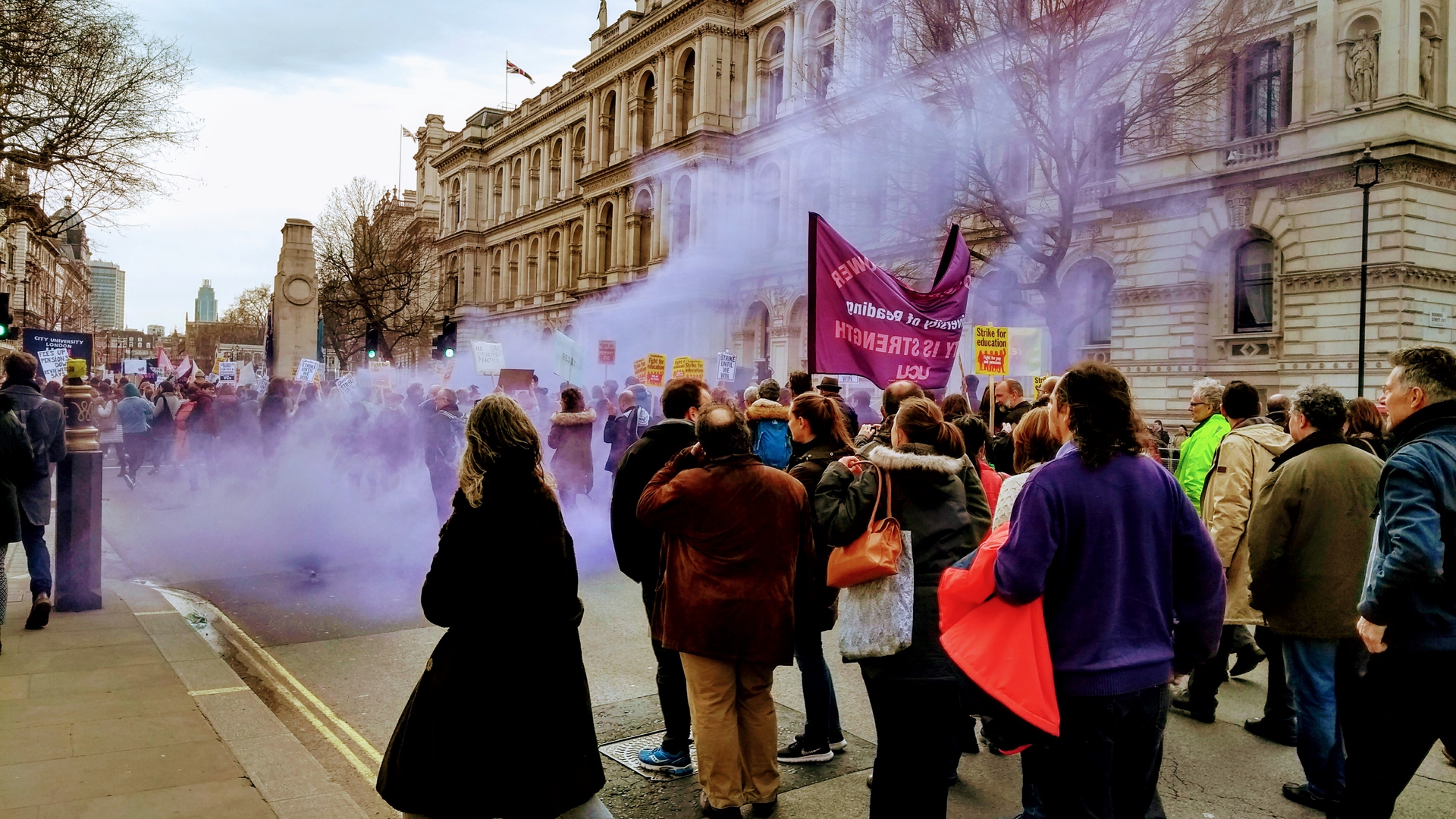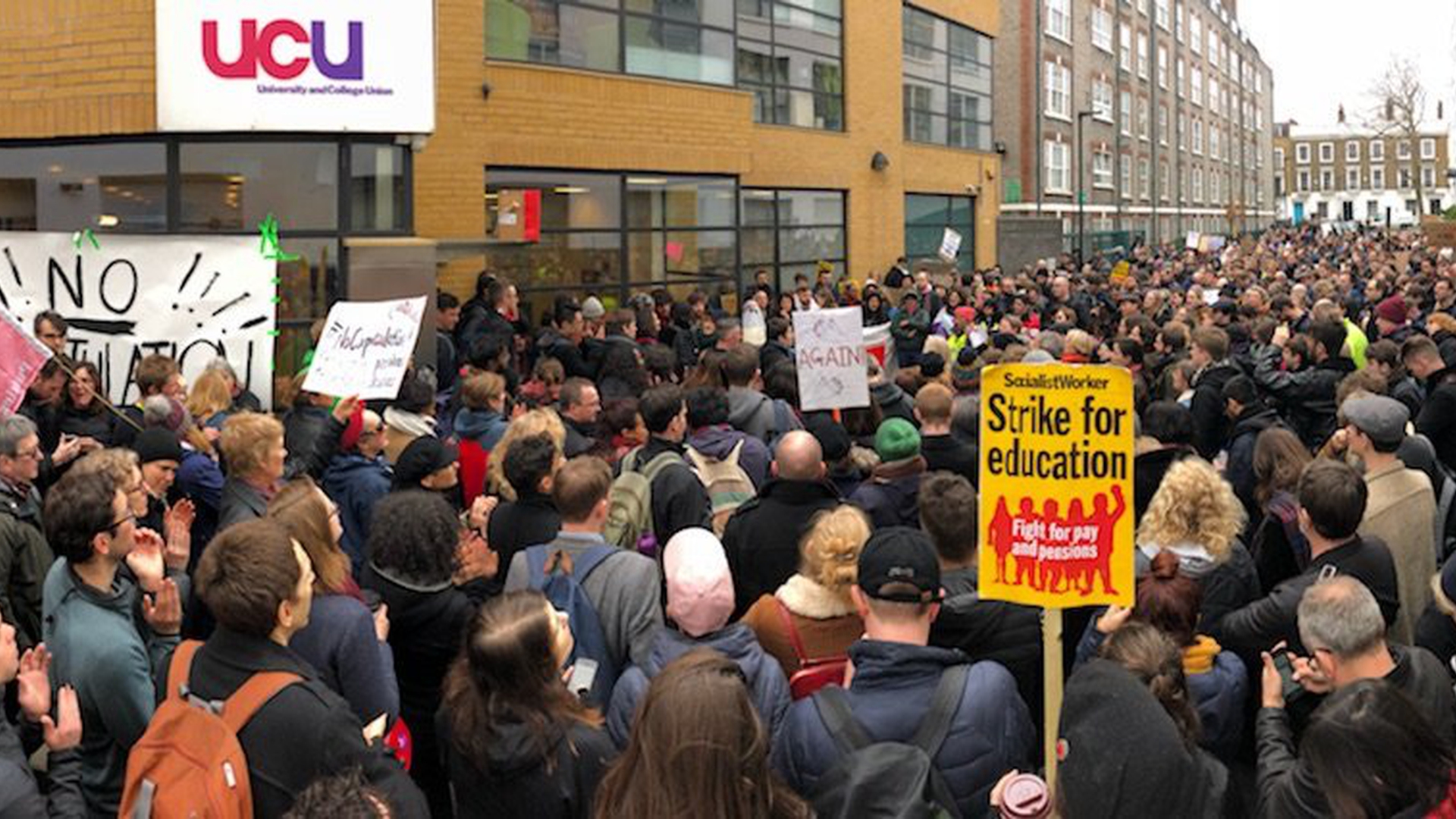After the first wave of strikes: how can we win?
by
Jamie Woodcock (@jamie_woodcock)
March 17, 2018
We may be taking a little break from the strikes, but UUK needs to know we’re coming for then when we’re back.

inquiry
After the first wave of strikes: how can we win?
by
Jamie Woodcock
/
March 17, 2018
We may be taking a little break from the strikes, but UUK needs to know we’re coming for then when we’re back.
The fourth week of the strikes over the USS pension scheme have now finished. The employers, UUK, are not budging. The UCU held up the full 14 days of strike action, which was a surprise to many of us. However, the union bureaucracy co-signed a deal at ACAS that would have represented a 19% cut of our pensions - along with a ridiculous claim that we would reschedule teaching missed during the strike for no pay.
This is far from the full story of the dispute. The rank and file membership of the union has led the strikes, with energy and creativity on picket lines across the country. We’ve held pickets and marched, come rain or snow. Branches have been revitalised and become organising centres. Early career and precarious academic workers have taken a leading role.
There has been a flowering of rank and file organising. This includes the bulletins we’ve been putting together along with others, homemade flyers and zines, mass meetings, and new connections being forged between workers.
When the UCU decided to bring the co-signed deal to a meeting of branch delegates (with no voting rights) and the HEC, many of us thought a sell out was in sight. We put together an open letter which was signed by over 10,000 people, every single branch delegate voted against it, and the meeting at the UCU HQ was met with lively demonstrations and flash occupations of the lobby. While the officials debated, the paid staff threatened to call the police on their own members, and the rank and file tried to get their voice heard.
The deal, which was so bad it should not have even been considered, was rejected. What this shows is that the rank and file of the union, despite the mobilisation and anger, may have changed the decision, but we are not in control. This wave of strikes is ending and the next 14 days have not been called - although there is a window of April-June. So what do we do now?
1- We need to demand the strike dates are called as soon as possible. This means those of us who were taking action debating the most effective way we can strike next.
This means thinking about what we’re doing at work. What are the activities we do that the university relies on? Broadly speaking, academic work can be divided into three parts: first, research, which until the REF and longer term funding bids, the university is relatively unconcerned with. This does mean we should start thinking about how we can disrupt this too. Second, administration, participating in the running of the university, which refusal to do so can have an impact. However, this is unevenly distributed between academic workers. Third, teaching. While lecturing, seminars, and engagement with students is the reason many of us do this, the university hires us so they can award degrees.
This means that for many of us, the most disruptive thing we can do is a marking boycott. The next wave of strikes is “targeted at exams and assessment” and UCU is also calling for external examiners to resign. Developing this into a boycott would prevent the awarding of degrees, but could also bring us into conflict with students. If we are to go down this route, we need to begin preparing now.
2- We need to make ASOS (Action Short of Strike) as effective as possible. This means thinking collectively and creatively about how it can cause maximum disruption. Again, this means looking at our own work and thinking about which aspects are important, but not explicitly included in our contracts.
As an example, the university relies on regular and responsive use of email. Why don’t we all stop using our work emails? Or at the bare minimum only check them from our work computers (after all the employer didn’t provide our smartphones or most of our laptops). We could send internal post instead.
3- We need to keep pressure up on the employer and the union bureaucracy, while keeping ourselves mobilised and organised.
ASOS provides a way to continue the dispute until the next strike days. Making this effective and exciting is key to keeping the momentum. We need to call organising meetings on our campuses to plan this, while also providing a regular opportunity for collective decision making. These decisions and demands then need to be fed into the national union structures with motions.
The Easter break is disruptive for our side. While we’re away from the campuses we need to keep organising. At Notes from Below, we’ll continue to publish the bulletin when appropriate, but also we’d like to invite people to write perspectives and share ideas too.
We may be taking a little break from the strikes, but UUK needs to know we’re coming for then when we’re back. We won’t accept a single penny cut from our pensions. And after we’ve won that, we’re coming for anyone who tried to sell us out or hold us back.
author
Jamie Woodcock (@jamie_woodcock)
Subscribe to Notes from Below
Subscribe now to Notes from Below, and get our print issues sent to your front door three times a year. For every subscriber, we’re also able to print a load of free copies to hand out in workplaces, neighbourhoods, prisons and picket lines. Can you subscribe now and support us in spreading Marxist ideas in the workplace?
Read next

University Worker: We Beat the Deal!
March 14, 2018

